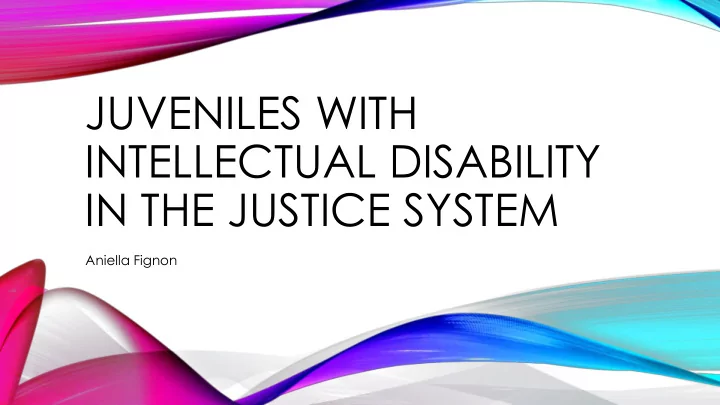

JUVENILES WITH INTELLECTUAL DISABILITY IN THE JUSTICE SYSTEM Aniella Fignon
WHAT ARE THE BARRIERS THAT JUVENILES INVOLVED IN THE JUSTICE SYSTEM FACE IN ACCESSING ENTITLED SERVICES? THE ORIGINAL QUESTION
WHY? • THERE IS VIRTUALLY NO DATA! • Target subjects belong to two protected classes • Important because of justice involvement • So I looked at statutes from across the nation
EVALUATIONS • C.R.S.A. § 19-2-922 Juveniles committed to department of human services-- evaluation and placement • (c)(3)(a) Evaluation for Postadjudicatory Placement • O.R.S. § 179.478. examination; commitment hearing; transfer; termination of sentence • (1) Commitment hearing for any youth offender or inmate to determine presence/level of ID • V.T.C.A. § 614.018. Continuity of Care for Juveniles with Mental Impairments • (b) Identification of juveniles with mental impairments in the juvenile justice system and collection and report of relevant data to the office required
SERVICES IN JUVENILE CORRECTIONS • T.C.A. § 33-3-403. Emergency residential care and treatment • Serious mental illness, emotional disturbance, or intellectual disability transfer from corrections to appropriate residential program within the Department of Mental Health and Substance Abuse Services • • VA Code Ann. § 16.1-280. Commitment of juveniles with mental illness or intellectual disability • Commitment to appropriate hospital or order mandatory outpatient treatment • Prohibition on placement in maximum security adult prison with violent criminals • 34-B M.R.S.A. § 6205. Services for juveniles committed to Long Creek Youth Development Center • (1) Consultation services for juveniles with ASD or ID • (2) Where a program (e.g. services) has been deemed appropriate, implementation of support service insofar as is possible
SERVICES IN JUVENILE CORRECTIONS • O.R.S. § 179.478. examination; commitment hearing; transfer; termination of sentence • (2) Commitment to Department of Human of Services for residential care, treatment and training • V.T.C.A. § 614.018. Continuity of Care for Juveniles with Mental Impairments • (a) Lays out responsibilities of Department of Corrections, specific players, et c. • (b)(3) Requirement to identify needed services with justice system • (c)(1) Identification of the medical, psychiatric, or psychological care or treatment needs and educational or rehabilitative service needs • (c)(2) Develop plan for implementation • (c)(3) Coordinate provision of continual treatment, care, and services throughout the juvenile justice system
EXITING THE SYSTEM • 34-B M.R.S.A. § 6205. Services for juveniles committed to Long Creek Youth Development Center • (3) Case management for juveniles with ASD or ID who have been released • V.T.C.A. § 614.019. Programs for Juveniles • (c) Discharged juveniles will receive continuity of care services from the office for a minimum of 90 days after discharge from the department and for as long as necessary for the child to demonstrate sufficient stability to transition successfully to mental health or provided by a local mental health or intellectual and developmental disability authority • V.T.C.A. § 152.00163. Child With Mental Illness or Intellectual Disability • (b) Juvenile board or local juvenile probation department to discharge juveniles with intellectual disability, unless sentencing requires an alternative But there are rules around who qualifies (e.g. completion of minimum sentence) • • V.T.C.A. § 152.00164. Examination Before Discharge • (c) Before a child who is identified as having an intellectual disability is discharged from the custody of a board or local probation department, the department shall refer the child for services if the child is not receiving services.
WHAT TYPES OF LAWS ARE IN PLACE THAT ADDRESS JUVENILES IN THE JUSTICE SYSTEM WITH INTELLECTUAL DISABILITY? THE NEW QUESTION
Recommend
More recommend